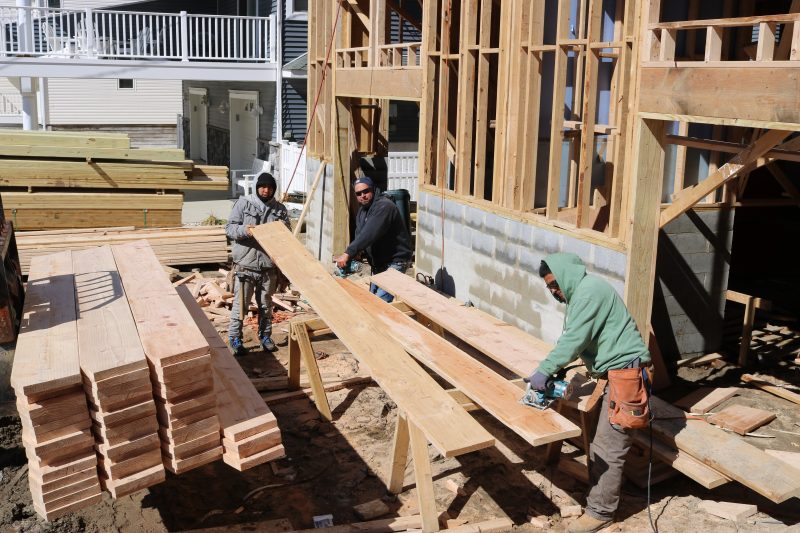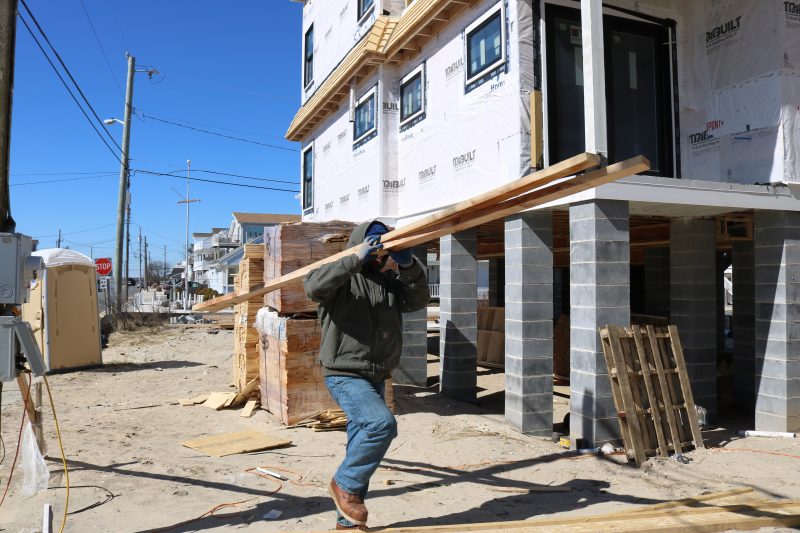Most home improvement contractors in New Jersey are governed by the “Contractors Registration Act.”
 By ANDREW J. LUCA
By ANDREW J. LUCA
Many of us get excited this time of year thinking about the beach and the upcoming summer fun just around the corner. Thoughts of awaking to the smell of eggs wafting from the stove, waffles in the toaster (apologies to the purists) and the bold aroma of coffee filling the house is a daydream we can all get lost in nowadays.
To be sure that daydream is not interrupted by nightmarish breakfast delays caused by a stove on the fritz, a kitchen faucet failing in its duty to fill the coffee pot or a leaking roof following the previous night’s thunderstorm, a visit from a contractor may be in order.
Home Improvement Contractors:
Most home improvement contractors in New Jersey are governed by the “Contractors Registration Act.” The act protects consumers by requiring that home improvement contractors follow a stringent set of rules when communicating and interacting with the buying public.
Finding a Contractor:
Word-of-mouth referrals from a trusted source are always helpful. They have already tested the waters and gone through the process with a particular contractor. Their firsthand information is invaluable as they can share their experiences with you – both the good and the bad.
Or, if you are choosing contractors by looking at advertisements (flyers, coupons, TV or the internet), take a moment to check out the company or proprietor with the state’s contractor database. You can find this resource at the New Jersey Department of Consumer Affairs’ website or click here:
https://newjersey.mylicense.com/verification/
This versatile site allows you to gather multiple names of contractors at one time for your consideration. Or, it will let you narrow your review to a specific contractor you may have already found and wanted to learn a little more about – such as if he or she or their company are in compliance with the state’s registration requirements, or if their contractor’s license has expired.
This website’s usefulness extends your ability to conduct similar searches on 51 other professions/professionals in New Jersey, ranging from acupuncture to social work examiners.

Contracts for home improvement work costing more than $500 must be in writing.
The Contract:
Any home Improvement contract over $500 must be in writing. If your job is $500 or below, you can ask your perspective contractor to put the parameters of your job in writing so you have it for your records, but they are not required to do so.
Contracts must be legible, written in clear language and must list all terms and conditions (i.e. materials, costs, timeframe, etc.) for which the parties will be held legally bound.
Each contract must contain the contractor’s: (1) legal name; (2) registered business address; and (3) state registration number.
How to Further Protect Yourself:
Don’t be bashful. Ask each contractor you are considering: (1) “How long have you been in business?” (2) “Do you carry insurance?” (3) “Do you have references?” (4) “Have you performed jobs like mine in the past?” (5) “Will you be using sub-contractors?”
Finally, all home improvement contracts over $500 should list in bold type how you, the consumer, can timely cancel the contract. There is no need to sign anything put in front of you until you are confident your due diligence has been done. While it is easy to simply “sign off” on something while everyone is standing there smiling in the soon-to-be-remodeled kitchen, remember to take a breath.
Privately review the contract at your leisure. Feel free to email your likely contractor any questions that may arise after your review so you will have a written record of their response – just in case.
Qualified, experienced and reputable organizations will not try to “hard sell” you. The job will wait a day or two and so will the professionally minded contractor who is interested in working with you to make that dream kitchen or leak-free roof a reality.

Homeowners are advised to take their time before signing any contracts for work on their property.
About the Author: Andrew J. Luca, Esquire is a co-founding member of CKL Law Group, LLP and has been practicing Real Estate and Consumer Fraud law in New Jersey for nearly 20 years.
 By ANDREW J. LUCA
Many of us get excited this time of year thinking about the beach and the upcoming summer fun just around the corner. Thoughts of awaking to the smell of eggs wafting from the stove, waffles in the toaster (apologies to the purists) and the bold aroma of coffee filling the house is a daydream we can all get lost in nowadays.
To be sure that daydream is not interrupted by nightmarish breakfast delays caused by a stove on the fritz, a kitchen faucet failing in its duty to fill the coffee pot or a leaking roof following the previous night’s thunderstorm, a visit from a contractor may be in order.
Home Improvement Contractors:
Most home improvement contractors in New Jersey are governed by the “Contractors Registration Act.” The act protects consumers by requiring that home improvement contractors follow a stringent set of rules when communicating and interacting with the buying public.
Finding a Contractor:
Word-of-mouth referrals from a trusted source are always helpful. They have already tested the waters and gone through the process with a particular contractor. Their firsthand information is invaluable as they can share their experiences with you – both the good and the bad.
Or, if you are choosing contractors by looking at advertisements (flyers, coupons, TV or the internet), take a moment to check out the company or proprietor with the state’s contractor database. You can find this resource at the New Jersey Department of Consumer Affairs’ website or click here: https://newjersey.mylicense.com/verification/
By ANDREW J. LUCA
Many of us get excited this time of year thinking about the beach and the upcoming summer fun just around the corner. Thoughts of awaking to the smell of eggs wafting from the stove, waffles in the toaster (apologies to the purists) and the bold aroma of coffee filling the house is a daydream we can all get lost in nowadays.
To be sure that daydream is not interrupted by nightmarish breakfast delays caused by a stove on the fritz, a kitchen faucet failing in its duty to fill the coffee pot or a leaking roof following the previous night’s thunderstorm, a visit from a contractor may be in order.
Home Improvement Contractors:
Most home improvement contractors in New Jersey are governed by the “Contractors Registration Act.” The act protects consumers by requiring that home improvement contractors follow a stringent set of rules when communicating and interacting with the buying public.
Finding a Contractor:
Word-of-mouth referrals from a trusted source are always helpful. They have already tested the waters and gone through the process with a particular contractor. Their firsthand information is invaluable as they can share their experiences with you – both the good and the bad.
Or, if you are choosing contractors by looking at advertisements (flyers, coupons, TV or the internet), take a moment to check out the company or proprietor with the state’s contractor database. You can find this resource at the New Jersey Department of Consumer Affairs’ website or click here: https://newjersey.mylicense.com/verification/ Contracts for home improvement work costing more than $500 must be in writing.
The Contract:
Any home Improvement contract over $500 must be in writing. If your job is $500 or below, you can ask your perspective contractor to put the parameters of your job in writing so you have it for your records, but they are not required to do so.
Contracts must be legible, written in clear language and must list all terms and conditions (i.e. materials, costs, timeframe, etc.) for which the parties will be held legally bound.
Each contract must contain the contractor’s: (1) legal name; (2) registered business address; and (3) state registration number.
How to Further Protect Yourself:
Don’t be bashful. Ask each contractor you are considering: (1) “How long have you been in business?” (2) “Do you carry insurance?” (3) “Do you have references?” (4) “Have you performed jobs like mine in the past?” (5) “Will you be using sub-contractors?”
Finally, all home improvement contracts over $500 should list in bold type how you, the consumer, can timely cancel the contract. There is no need to sign anything put in front of you until you are confident your due diligence has been done. While it is easy to simply “sign off” on something while everyone is standing there smiling in the soon-to-be-remodeled kitchen, remember to take a breath.
Privately review the contract at your leisure. Feel free to email your likely contractor any questions that may arise after your review so you will have a written record of their response – just in case.
Qualified, experienced and reputable organizations will not try to “hard sell” you. The job will wait a day or two and so will the professionally minded contractor who is interested in working with you to make that dream kitchen or leak-free roof a reality.
Contracts for home improvement work costing more than $500 must be in writing.
The Contract:
Any home Improvement contract over $500 must be in writing. If your job is $500 or below, you can ask your perspective contractor to put the parameters of your job in writing so you have it for your records, but they are not required to do so.
Contracts must be legible, written in clear language and must list all terms and conditions (i.e. materials, costs, timeframe, etc.) for which the parties will be held legally bound.
Each contract must contain the contractor’s: (1) legal name; (2) registered business address; and (3) state registration number.
How to Further Protect Yourself:
Don’t be bashful. Ask each contractor you are considering: (1) “How long have you been in business?” (2) “Do you carry insurance?” (3) “Do you have references?” (4) “Have you performed jobs like mine in the past?” (5) “Will you be using sub-contractors?”
Finally, all home improvement contracts over $500 should list in bold type how you, the consumer, can timely cancel the contract. There is no need to sign anything put in front of you until you are confident your due diligence has been done. While it is easy to simply “sign off” on something while everyone is standing there smiling in the soon-to-be-remodeled kitchen, remember to take a breath.
Privately review the contract at your leisure. Feel free to email your likely contractor any questions that may arise after your review so you will have a written record of their response – just in case.
Qualified, experienced and reputable organizations will not try to “hard sell” you. The job will wait a day or two and so will the professionally minded contractor who is interested in working with you to make that dream kitchen or leak-free roof a reality.
 Homeowners are advised to take their time before signing any contracts for work on their property.
About the Author: Andrew J. Luca, Esquire is a co-founding member of CKL Law Group, LLP and has been practicing Real Estate and Consumer Fraud law in New Jersey for nearly 20 years.
Homeowners are advised to take their time before signing any contracts for work on their property.
About the Author: Andrew J. Luca, Esquire is a co-founding member of CKL Law Group, LLP and has been practicing Real Estate and Consumer Fraud law in New Jersey for nearly 20 years.